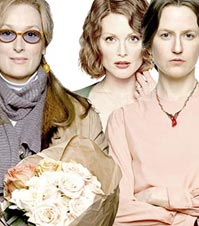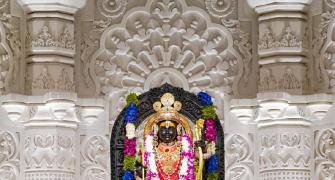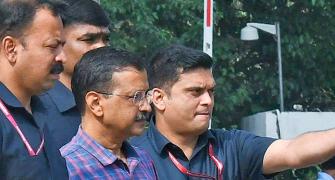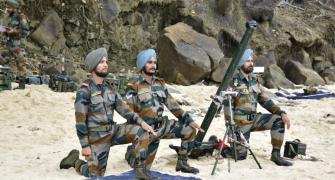Stephen Daldry's The Hours makes a shocking premise -- that suicide is an acceptable response to a faulty world. The three main characters in the movie are the writer Virginia Woolf (Nicole Kidman), a 1950s housewife Laura Brown (Julianne Moore) and a contemporary Greenwich Village book editor Clarissa (Meryl Streep).

These three women wrestle -- with varying amounts of success -- with the ideas of existence and extinction. They also grapple with their amorphous sexualities, again with unresolved success. In the end, only one idea is left supreme: suicide is not a permanent solution to a temporary problem, but an essentially heroic act.
When Woolf's harried husband Leonard asks her who will die in the novel she is working on, the reply is: "The poet, the visionary." He must die so that the rest of us may value life more than we do. That is the film's central justification for self-murder. It is an extraordinarily weak argument.
There are two suicides in the course of the film. When an AIDS-ravaged poet, the book editor's former lover, finally does himself in, it is a moment, not of despair, but of release. How will he endure 'the hours' he asks, before supplying himself with a terminal answer.
Woolf pens a terrible note to her husband before hurrying to a river where she weighs herself down with a stone and drowns. As she drifts along the river's bottom, her shoe drifts off into the current. Kidman plays her not as an addled Ophelia, but as a fierce intellect who takes matters into her own hands.
From a screenplay by David Hare, Daldry directs a version of Michael Cunningham's best-selling book which itself is a version of Virginia Woolf's first novel Mrs Dalloway. There is no linearity in the film but in the end a strong narrative emerges despite the stream-of-consciousness prose and the eccentric timeline.
Kidman's Woolf is the role of her career, placing her in the company of the very best actresses in contemporary cinema. Wearing a prosthetic nose that changes her face to an almost unrecognisable extent, Kidman exudes a fierce intelligence at odds with everything in her vicinity from her servants to the conductor at the local train station. Not even her doting husband, publisher Leonard Woolf, is exempt from her ferociousness.
As she sits in an upstairs room smoking hand-rolled cigarettes and surrounded by sheaves of manuscript pages, Kidman begins to assume a gravitas and dignity that becomes instructive to watch. It is the eternal struggle against extinction as represented by the endless desert of the blank page. Any victory, Kidman's blank gaze into the void seems to imply, is only temporary.
Moore's California housewife is much like her character in Far From Heaven. There are so many areas of overlap, it becomes strangely disorienting. But Moore has the film's best scene when she checks herself into a hotel, takes out several bottles of pills, obsessively rereading Mrs Dalloway. She lies back against the bedspread and just then the river in which Woolf has drowned surges from under the bed and takes Moore into its cold comfort.
Brown and Clarissa inhabit the same world as Woolf's fictional characters -- that is the most obvious connection. They are intelligent women who cannot accept the fact that their lives have turned out to be more trivial than they could ever have expected. Events conspire to turn their lives into carnivals of the humdrum.
Streep's performance, as much as Kidman's, is Oscar material. There are few actors who can convey as much emotion with as little. The film hinges on her character. Named Clarissa, after Mrs Dalloway, she is the hinge on which much of the film's action rests. In the end, it is her character that gives the film some closure.
The excellent Toni Colette, as a friend and neighbour of Moore's, rates special mention. She appears in a cameo as a woman in the grip of a cancer scare. When Moore's character plants an impulsive full-blooded kiss on her mouth, all Colette says is, "You're sweet." As with much of the movie, there is plenty of ambivalence in that one moment.
You don't need to have read the book to understand the movie. Some knowledge of Mrs Dalloway -- prescribed as a school text in many parts of the world -- and The Hours will help, of course. It helps to know, for instance, that the book takes place in a single day, painting its characters' entire lives in the space of 24 hours.
It is Daldry's achievement that viewers with no experience of the film's literary underpinning will be able to follow the narrative.







